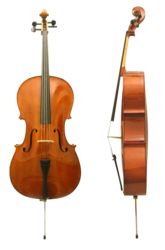'cello

Cello, front and side view. The endpin at the bottom is retracted or removed for easier storage and transportation, and adjusted for height in accordance to the player.
|
|
| String instrument | |
|---|---|
| Other names | Violoncello |
| Hornbostel–Sachs classification | 321.322-71 (Composite chordophone sounded by a bow) |
| Developed | about 1660 from the bass violin |
| Playing range | |
| Related instruments | |
The cello (/ˈtʃɛloʊ/ CHEL-oh; plural cellos or celli) or violoncello (/ˌvaɪələnˈtʃɛloʊ/ VY-ə-lən-CHEL-oh;Italian pronunciation: [vjolonˈtʃɛllo]) is a bowed or plucked string instrument with four strings tuned in perfect fifths. The strings from low to high are generally tuned to C2, G2, D3 and A3, an octave lower than the viola. It is a member of the violin family of musical instruments, which also includes the violin and viola and the double bass. The cello is used as a solo musical instrument, as well as in chamber music ensembles (e.g., string quartet), string orchestras, as a member of the string section of symphony orchestras, and some types of rock bands. It is the second-largest and second lowest (in pitch) bowed string instrument in the modern symphony orchestra, the double bass being the largest and having the lowest (deepest) pitch.
...
Wikipedia

